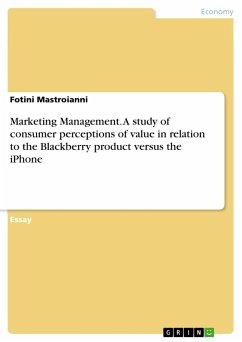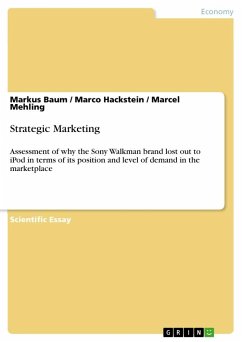Bachelor Thesis from the year 2013 in the subject Business economics - Offline Marketing and Online Marketing, grade: 1,7, Karlshochschule International University, course: International Marketing, language: English, abstract: The aim of this thesis is to investigate and identify reasons for brand loyalty of the Apple-iPhone brand in Germany and to make recommendations for customer relationship and brand managers. The methods used are secondary and primary, quantitative research, with a cross-sectional online survey consisting of a 5-point Likert scale.Brand loyalty is operationalized as switching intention, based on prior research. The theoretical background shows that there are two contrary views when investigating switching intention. On the one side, there is the conventional perspective with the motivation of functional utility maximization. People are motivated to switch a brand, when they believe they will gain perceived value, which is the customer's overall assessment ofthe utility of a product based on perceptions of what is received and what is given. On the other side, there is the social identity theory perspective with social mobility as motivation. Social mobility refers to a person's attempt to part him- or herself from a group. With regard to brands, this implies that customers switch brand identities, when they believe they identify themselves more with another brand.Those two perspectives have been tested using two hypotheses with an online survey and 111 valid responses of Apple-iPhone users in Germany. The independent variables perceived value, customer brand identification and procedural switching costs were investigated using items from prior research. Items by an advanced theory of the technology acceptance model were used for perceived value. To analyze the data descriptive, reliability, correlation and regression analyses have been applied. In conclusion, customer brand identification and procedural switching costs shows an equally strong significance for predicting switching intention. Perceived value could not be measured, since it did not pass the stepwise multiple regression analysis.








